Stay always informed
Interested in our articles? Get the latest information and analysis straight to your email. Sign up for our newsletter.
The EU's ambitious promise to cut down on pesticides was derailed by a toxic combination of pesticide lobby groups and right-wing political groups in election mode. This means the EU has failed to respond to the demand by over 1 million citizens for the EU to drastically reduce pesticide use and to support farmers in this transition.
Ahead of the EU elections, PAN Europe, Friends of the Earth Europe, and Corporate Europe Observatory present a set of voting score cards by EU political group on the pesticide reduction proposal. These score cards allows the public to see in a glance which groups defended for instance the health of farmers, their right to independent advice on pesticides, citizens' right to clean water - and those who didn't.
Six amendments key aspects of the defeated pesticide reduction law, for which voting results per MEP were available, were chosen. Score cards have also been produced for specific EU Member States, showing voting results by national party: in Austria, Belgium, France, Germany, Italy, Netherlands, Poland and Spain.
These are the results:
Already under current legislation, pesticides should only be used as a last resort. However, EU member states do not implement this. The new pesticide regulation aimed to further define and concretise crop-specific IPM rules, ensuring they are effectively applied. The following graph shows which percentage of the political groups supported – or not – these mandatory rules.
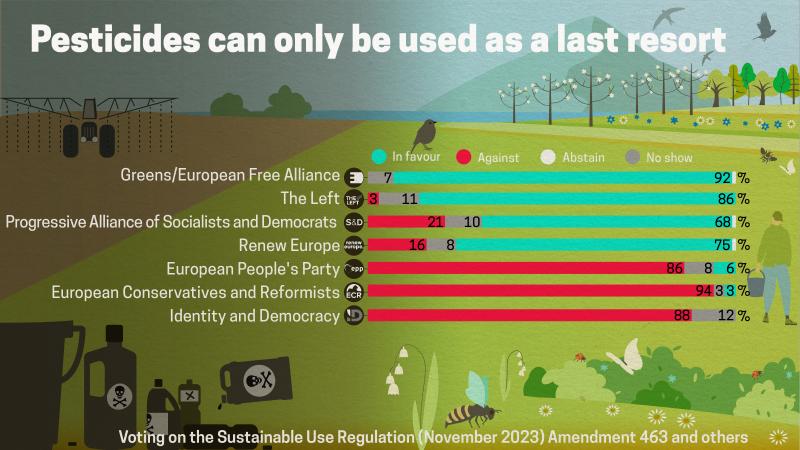
Pesticide pollution in water poses severe risks and incurs significant costs for society. Check out which percentage of political groups voted in favor of measures to better protect water sources from pesticide contamination.
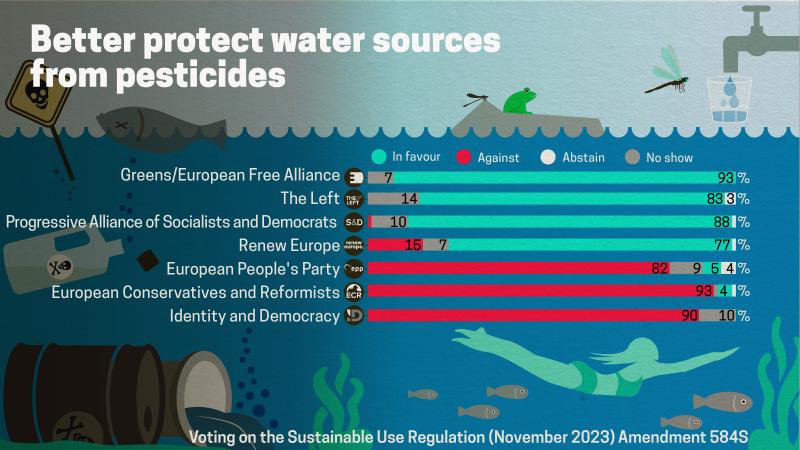
The responsibility of reducing pesticide use should be borne especially by food industry and supermarkets – certainly not by farmers alone. Take a look which political groups supported holding them also accountable for reducing pesticide use - and which did not.
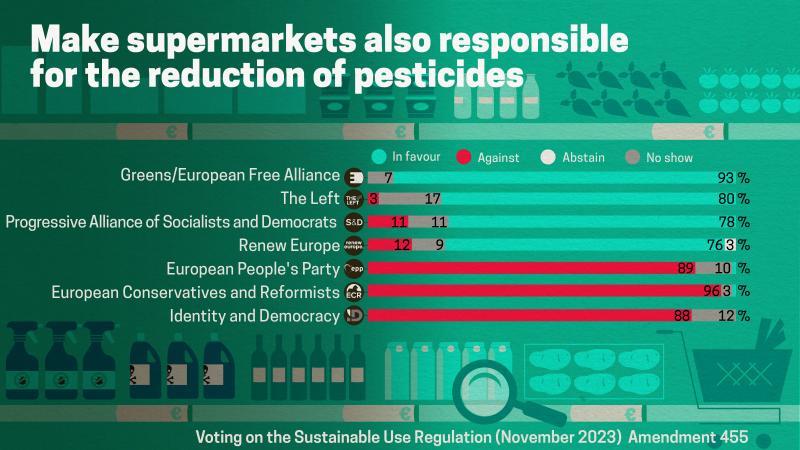
Farmers often do not have access to independent advice to reduce pesticides. Their advisors are now often linked to pesticide corporations, raising concerns about conflicts of interest. Regular independent advice is crucial to help break free from the pesticide industry’s grip and support farmers in adopting alternative practices. Which political parties were in support of farmers receiving at least once a year independent advice, instead of every three years, and which were not?
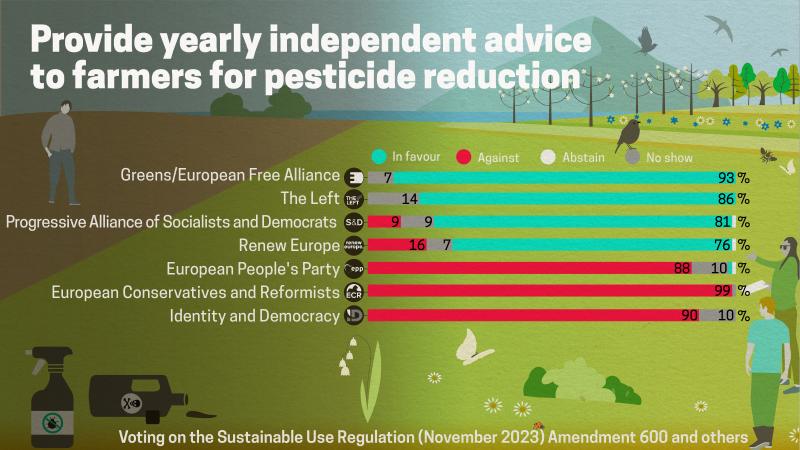
This visual shows which political groups voted against an amendment to set a higher reduction target for the most harmful pesticides, to 65% by 2030 instead of 50%, and those who voted in favour. For these highly toxic pesticides, a 50% reduction is far from ambitious enough to protect citizens, farmers and nature, and a full phase out is necessary.
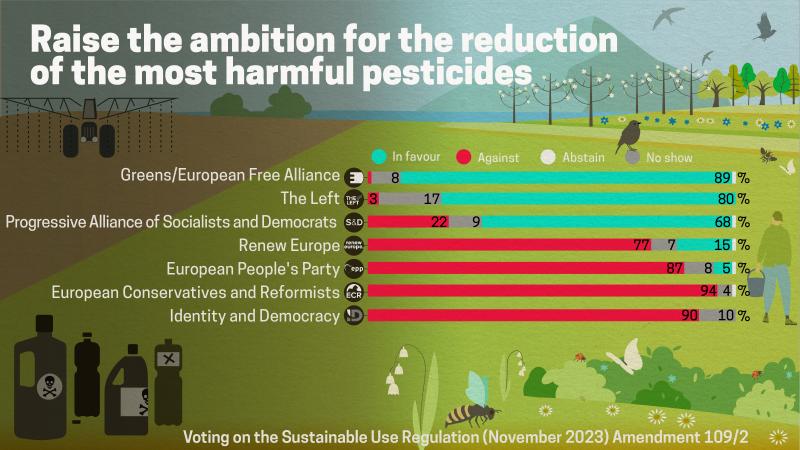
The proposed new law would ban the use of pesticides in sensitive areas such as nature protected areas, public areas, parks and playgrounds. This measure aimed to better protect citizens, especially vulnerable groups, and our ecosystems. The following graph illustrates which percentage of the political groups supported this essential protection.
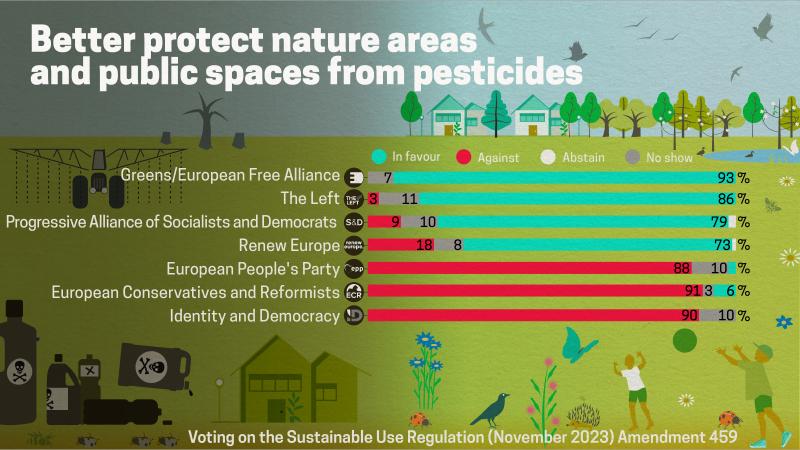
On all topics, the large majority or all of the christian-democratic EPP group, the conservative (to far-right) ECR and the far-right ID group voted consistently against the interests of people. These groups do not even support farmers getting regular independent advice on pesticides, or a higher reduction of the most harmful ones! Undermining urgently needed measures to reduce pesticide use harms the well-being of citizens, the health of our ecosystems and a long term perspective for farmers. As citizens across Europe head to the EU elections polls for, voters should be aware of how political groups (mis)represented their interests when given the opportunity.
Voters from Austria, Belgium, France, Germany, Italy, Netherlands, Poland and Spain also have the possibility to check out how MEPs from their national parties voted.
Voters from all EU countries can also check how individual MEPs voted in an overview table.
The data for the graphs has been collected through the results of the roll-call votes of the plenary vote of the European Parliament on the SUR proposal, which took place on 22 November in Strasbourg. The results were also verified through MEP watch.
More information on the six amendments can be found in this article by Friends of the Earth Europe.